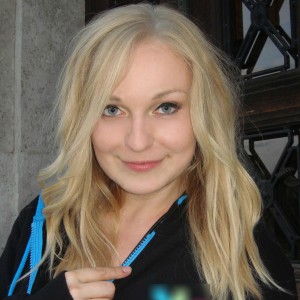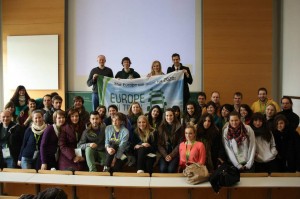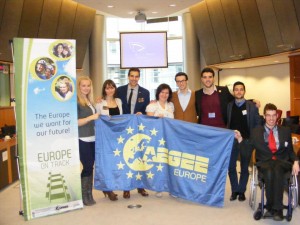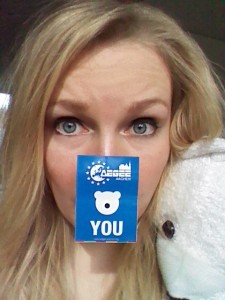Réka Salamon is a 23 years old girl from Debrecen. Hungarian by nationality (her first local was AEGEE-Debrecen), German by adoption (she moved in Cologne and she joined AEGEE-Aachen), she is running for the position of President of AEGEE-Europe. If elected, she is going to be the first female President since Agata Pateka from AEGEE- Poznań (2009-2010). She is currently doing the internship for President candidates in the CD house and she is the Content Coordinator of the Europe on Track 2 project of AEGEE-Europe, as she was for the first edition. She joined AEGEE in april 2011 and since then she was engaged in a lot of local activities, being PR responsible and Vice president of AEGEE-Debrecen, and European level too. She currently is: Speaker of the Public Relations Committee, Quality Assurance Responsible of the Quality Assurance Committee and member of the Y Vote 2014 Communication Team.
The AEGEEan: What do you think your main task as the president would be?
 Réka: Form a strong team with the CD in Brussels, so we can trust and rely on each other and so all of us can do their best for AEGEE. Working in the headoffice is difficult, the pressure, the workload and “locked together” for a whole year – it has turned out to be an unpleasant experience for many people. The president needs to listen and understand the needs of the team and support them when they need a good motivation to continue.
Réka: Form a strong team with the CD in Brussels, so we can trust and rely on each other and so all of us can do their best for AEGEE. Working in the headoffice is difficult, the pressure, the workload and “locked together” for a whole year – it has turned out to be an unpleasant experience for many people. The president needs to listen and understand the needs of the team and support them when they need a good motivation to continue.
Another part of my job would be the representation of the association externally – but this cannot happen without maintaining a close link to the Network and being able to really represent young Europeans’ opinion on a daily basis. I have gathered extensive knowledge on the working mechanism of the European institutions during my university years so lobbying for the best interest of AEGEE is a challenge I am going to enjoy.
The AEGEEan: If you are going to be elected as president of AEGEE-Europe, what will be the first thing you are going to do?
Réka: I will go directly to the beach and run into the sea – taking all my friends with me. The same thing will happen if I don’t get elected.
The AEGEEan: What is leadership for you?
Réka: Being a leader is being the inspiration and driving force for the people around you. Coming up with new ideas, motivating your team members and working for the common vision you want to achieve together. Listen to them, understand their reality and support them when needed. Being part of the Comité Directeur – being one of the leaders in AEGEE – is being the guide for the entire association and the strong backbone of the work we are doing to achieve the goals we are setting for ourselves. Always aiming higher, making Europe a better place, little by little.
The AEGEEan: How would you briefly describe in one sentence the current situation of AEGEE, regarding internal structures and activities?
Réka: Decentralised synergy
The AEGEEan: What would you do differently than your predecessor, Luis?
Réka: I have always admired and respected the reckless drive Luis has been moving AEGEE forward and this transformation into a more professional and a more influential AEGEE on the political sphere has been something our founders had dreamt of and a step forward that has been much needed. However, I believe it is time for us to slow down a little regarding the processes in Brussels and let the Network catch up with all the changes on the European level. With a network as wide and diverse as ours, it takes a little more time.
The AEGEEan: Is AEGEE really working well enough at all levels in your opinion?
Réka: AEGEE is working well and I do think our Network is not even aware of the real potential and impact it can have on the European and on the global field. We have some imperfections to fix but with open dialogue and communication we can always aim higher fuelled by our relentless idealism, yet maintain a realistic approach towards our mistakes and do better next time!
The AEGEEan: We speak a lot about the gap between the EU and the locals. What do you think we need to do to fill it?
Réka: We need to strengthen the Network Commission. Their mediator role between these levels is of immense value. The NetCom needs AEGEE-Europe’s support to keep a better overview of the activities, needs and strengths of the locals and to aid the cooperation between European level and local level. Active communication is the key and we cannot rely only on our mailing lists to keep the information channel alive. More network meetings, more live meeting for projects are needed and I would also invest in a new form of training in AEGEE: training for netcommies and for presidents of AEGEE locals.
The AEGEEan: Do you have a strategy about convincing locals to cooperate with other NGOs?
Réka: It is known that I am a strong supporter of local NGO cooperation from the very beginning of my AEGEE life when co-organised a huge local conference in cooperation with ESN, AIESEC and the local Student Union. We represent the same and similar opinion when it comes to the idea of Europe and our call for the active and aware European citizens of tomorrow can only be amplified if we join forces (and finances). Through examples like this I would try to highlight the benefits of these kinds of cooperations and offer the help of AEGEE-Europe with establishing the dialogue on the local level.
The AEGEEan: How will you make the cooperation with the AEGEE-Academy better? How will you make it strong?
Réka. The Academy holds one of the greatest potentials in strengthening AEGEE’s role as a platform that provides quality education for its members so they can obtain skills and competences they will need in their later life. A strategic meeting needs to be organised with the Academy to develop AEGEE’s training calendar together and also to involve the respective european level bodies (PRC, HRC etc.) to ensure the events uphold to the learning objectives and the participants will both enjoy and learn a lot during the event. At the moment, as the speaker of PRC, I am working on the next PR European School together with the Academy and I hope this event to set an example for the future successful cooperation between an AEGEE body and AEGEE’s trainers.
 The AEGEEan: Do you have any strategy to make our voluntary work recognized by the institutions/universities?
The AEGEEan: Do you have any strategy to make our voluntary work recognized by the institutions/universities?
Réka: The current CD has already started this process so my contribution is to develop the idea and reach the set objectives. I think I speak for many of us when I say I have learnt more during my 3 years in AEGEE than during 5 years at the university and we have to make this experience count also externally. The implementation of the system of recognising the value of non-formal education in AEGEE is a complex process which should first start with the precise impact measurement and the evaluation of the competences we are gaining through our work, what are the skills that we are developing and how can we measure this development for each member.
Providing our members with certification about the skills developed, making our projects internationally known and ideally, providing the external world with the standard portfolio of an AEGEE member and the skills we are developing are only a few ideas that can help us in ensuring the external world (including our future employers) are aware that the knowledge we gained through this voluntary experience actually – in some cases – is worth more than our degree from the university.
The AEGEEan. Do you think we need to focus on the enlargement of focus on the enforcement?
Réka: With a thorough strategy and preparation, both processes can be maintained. My idea of enforcement is to invest more in the development of the entire Network (without the constraints of the European continent) and even if geographically there are borders on the map, AEGEE’s reality is being a pan-European and transcontinental youth organisation which is an attribute we should all be proud of and a Network we should develop to reach its full potential to have a real impact not only in Europe but also in the global discussions.
The AEGEEan: How will you be lobbying for youth rights?
Réka: When decisions are taken on such a high platform like the so-called Euro-bubble in Brussels, it is always a matter of knowledge and research, who are the key figures and where are those phases in the legislative process where you can let your voice be heard. For instance, during the drafting of the new Multiannual Financial Framework of the European Commission, the lobby work of AEGEE, the European Youth Forum etc. played a key role in including a separate chapter for the institutional financial support of youth organisations and that wide-scale initiatives like the new Erasmus+ programme recognises and supports the youth as one of the core elements in the development. Former and current CD members were, are and will continue to be there to put pressure on the institutions, to ask questions concerning the inclusion of young people in the decision-making processes and to win over politicians to support our cause by showing the reality of our work: we care about Europe and we are the next generation of future leaders, therefore our opinion matters and should be taken seriously.
The AEGEEan: What are your strengths and what are your weaknesses?
Réka: I am a creative person. My visionary state of mind allows me to think outside the box, to keep calm and solve problems without panicking and to be a crazy workaholic when it comes to turning my vision into reality. On the other hand I am a pragmatic thinker, which means I don’t get too carried away and set ambitious but realistic goals for myself. I am a maximalist, which is only a weakness when you are the last one leaving the office because you cannot leave the work undone and imperfect. Consequently I usually lack sleep. Also, honesty is my core element. You decide whether it’s a strength or a weakness.
The AEGEEan: Léa made her intention of running for presidency a long time ago. Paul came out a little bit as a surprise. What do you think about your fellow competitors?
Réka: I have had the chance to work with both of my fellow candidates and even though we do not know each other perfectly, I truly value their work and the characters I got to know. These days I am mostly focusing on my own projects and the Agora preparations so I only wish them the best of luck on stage and I hope all of us see the challenge ahead as a transformative and lifelong learning experience – at least this is the way how I feel about the elections.
The AEGEEan. Why do you think people must vote for you? What are your plans if you are elected as president?
Réka: I have joined AEGEE exactly 3 years ago with the plan that I want to explore the full potential of this organisation, reinforce its presence as one of the most influential student organisations in Europe, while not losing our identity as a network of young activists, explorers and educators. If elected as president of AEGEE-Europe, I am going to continue my work on balancing our external impact and strengthening the bond of our Network.
Written by Erika Bettin, AEGEE-Venezia

